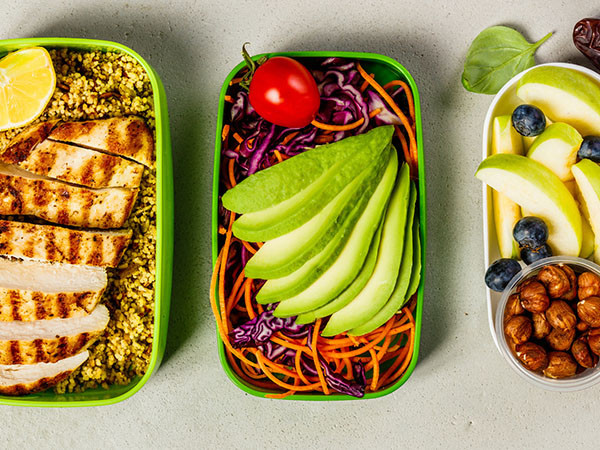
Counting steps is good — is combining steps and heart rate better?

Appendix pain: Could it be appendicitis?

Can saw palmetto treat an enlarged prostate?

How does Ozempic work? Understanding GLP-1s for diabetes, weight loss, and beyond

Zinc: What it does for the body, and the best food sources

Respiratory health harms often follow flooding: Taking these steps can help

Tips to leverage neuroplasticity to maintain cognitive fitness as you age

Can white noise really help you sleep better?

Celiac disease: Exploring four myths

What is prostatitis and how is it treated?
Nutrition Archive
Articles
Legume of the month: Chickpeas
Also known as garbanzo beans, chickpeas are featured in an array of dishes throughout the world, including in Africa, India, the Middle East, and Europe. Chickpeas are rich in fiber, folate (vitamin B9), manganese, and other minerals. Several studies have found that eating chickpeas may improve cholesterol levels and reduce blood sugar.
Americans may be most familiar with hummus, a blend of chickpeas and sesame paste that's so popular you can even find it in small convenience stores. But chickpeas are also being used in a range of other products, including pasta and rice as well as snack foods such as chips, fries, and "puffs."
Eating more nuts may improve sexual function
In the journals
Need a sexual boost? Eat more nuts. A recent study found that men who added 60 grams — about 1/2 cup — of nuts to their daily diet improved several aspects of their sexual life. The results were published online June 19, 2019, by the journal Nutrients.
Researchers asked 83 healthy men to follow either a traditional Western-style diet without nuts, or a Western-style diet that also included 60 grams (about 360 calories) of a nut mixture made from almonds, hazelnuts, and walnuts every day. A questionnaire assessed their current sexual function.
Can I reverse prediabetes?
Ask the doctors
Q. My doctor recently told me I have prediabetes. Is this condition reversible?
A. Yes, it is possible to reverse prediabetes. Prediabetes is a condition that affects millions of Americans. The CDC estimates that as many as one in every three American adults has the condition, which is defined as having blood sugar that is elevated, but not high enough to meet the threshold for diabetes. Left untreated, prediabetes can progress to diabetes, a condition in which your body is not able to absorb glucose for energy properly, causing blood sugar to rise. If it's not managed properly, diabetes can lead to a number of health problems, from heart attack and stroke to blindness, kidney problems, and infections, among others. But making some lifestyle changes can reduce the risk that your prediabetes will develop into diabetes.
Keep your health habits on track during the holidays
Put the focus on friends, family, and fun, instead of food.
It's November, time for Thanksgiving and the start of the holiday season, which is also known as the time of year when healthy habits slide off track and waistbands get tighter.
"The truth is, people do tend to abandon healthy habits during the winter," says Dr. Beth Frates, clinical assistant professor of physical medicine and rehabilitation at Harvard Medical School. Blame the cold weather that keeps you inside and makes you feel sluggish, or the parade of holiday parties. Who wants to stick to a diet or trudge to the gym?
Healthy meals: 3 easy steps to success
Comfort food without the guilt
Simple swaps like whole grains instead of white rice maintain flavor while boosting health benefits.
There's nothing quite like coming in from the cold and sitting down to a hot, hearty meal. The icy temperatures seem to make us yearn for foods that will warm us up inside, stick to our bones, and soothe the soul. "We are warm-bodied creatures, and as the weather cools we actually crave more calories so we can stay warm," explains Sandra Allonen, a registered dietitian with Harvard-affiliated Beth Israel Deaconess Hospital.
But digging into comfort foods all winter — like a savory beef stew, spicy spaghetti and meatballs, macaroni and cheese, fluffy pancakes, gooey pizza, or buttery mashed potatoes — comes with health risks.
Menu alert: U.S. restaurants are offering more sugary drinks
News briefs
Sugary drinks are becoming more plentiful at large restaurant chains, and some drinks are getting sweeter. That's according to a study published in the August issue of the American Journal of Preventive Medicine. Harvard researchers analyzed the beverage offerings of 63 fast-food, fast-casual, or full-service restaurant chains from 2012 to 2017. Over that period, the number of sugary beverages available at the restaurants increased by 82%. Among newly introduced sugary beverages such as sodas, fruit drinks, and sports drinks, from 2012 to 2016 the number of calories per drink increased by about 50, and the average amount of sugar per drink reached a whopping 63 grams. Newly introduced sweetened teas roughly doubled in sugar and calories from 2012 to 2016, jumping from an average of about 140 calories per drink to about 300, and from 25 grams of sugar to 56. But remember: the American Heart Association recommends limiting added sugar to 25 grams per day for women and 36 grams per day for men. If you want to splurge on a sugary drink, try not to consume all of it, or chose a lower-sugar option.
Image: LiliGraphie/Getty Images
Cafeteria strategies that may improve your diet
News briefs
Red light, green light — we all know what those mean. And when Harvard researchers added traffic-light symbols to packages and menus in a hospital cafeteria, they found that diners bought healthier foods with fewer calories. The findings were published online July 10, 2019, by JAMA Network Open. Scientists first tracked the cafeteria purchases of hospital employees for a few months. Then they labeled foods with symbols indicating if a food was healthy (green), less healthy (yellow), or unhealthy (red); moved unhealthy foods to less accessible locations in the cafeteria; and tracked purchases for another two years. About 5,700 people bought food during that time. When researchers linked calorie information to purchases, they found a 6% decrease in calories per purchase over two years, including a 23% decrease in calories from the least healthy foods. This builds on previous research that found sales of red-stickered items dropped by 4% and sales of green-stickered items grew by 5% during the study. Can you try this at home? Maybe not the traffic-light stickers. "But making it harder to access unhealthy foods gives you enough time to think about your choice before eating something that is not consistent with your goals," says lead author Dr. Anne Thorndike, who specializes in obesity treatment and prevention at Harvard-affiliated Massachusetts General Hospital. "Strategies include having a drawer for the unhealthy foods, placing unhealthy snacks high on a shelf, and having a goto' shelf for healthy snacks."
Image: lcs813/Getty Images
The right way to "do lunch"
Smart choices for your midday meal may help set the stage for healthier eating throughout the day.
The classic American lunch — a deli sandwich, potato chips, and a soda — isn't exactly heart-friendly fare. Even salad bars can be tricky to navigate when you're trying to choose a nutritious but satisfying lunch. In fact, more than half of employed Americans who usually eat lunch on the job find it hard to eat a healthy lunch, according to a recent survey from the American Heart Association.
"Helping people understand what makes a healthy lunch may help them eat fewer calories and maybe even inspire them to make healthier food decisions the rest of the day," says Dr. Anne Thorndike, associate professor of medicine at Harvard Medical School. In a study of nearly 5,700 hospital employees, she and colleagues found that labeling cafeteria foods with simple "traffic light" symbols that reflected their relative health value was linked to healthier choices by employees. They ate fewer calories, mostly by eating fewer high-fat, high-calorie "red light" foods and more "green light" foods (in which the main ingredient was fruit, vegetable, whole grain, lean protein, or low-fat dairy). What's more, these dietary shifts lasted over a period of two years. For employees who visited the cafeteria most frequently, the estimated drop in calories could translate to a weight loss of up to 4.4 pounds over time, says Dr. Thorndike. The study was published July 10 in JAMA Network Open.
Legume of the month: Peas
When you were a kid, you may have lumped peas into the same category as broccoli, spinach, or any other green plant on the plate. But green peas aren't the same as leafy greens. In fact, their classification is a little tricky.
Mature green peas — typically sold dried and split in half — are more like beans. But fresh or frozen green peas are classified as a starchy vegetable by the U.S. Dietary Guidelines.

Counting steps is good — is combining steps and heart rate better?

Appendix pain: Could it be appendicitis?

Can saw palmetto treat an enlarged prostate?

How does Ozempic work? Understanding GLP-1s for diabetes, weight loss, and beyond

Zinc: What it does for the body, and the best food sources

Respiratory health harms often follow flooding: Taking these steps can help

Tips to leverage neuroplasticity to maintain cognitive fitness as you age

Can white noise really help you sleep better?

Celiac disease: Exploring four myths

What is prostatitis and how is it treated?
Free Healthbeat Signup
Get the latest in health news delivered to your inbox!
Sign Up









